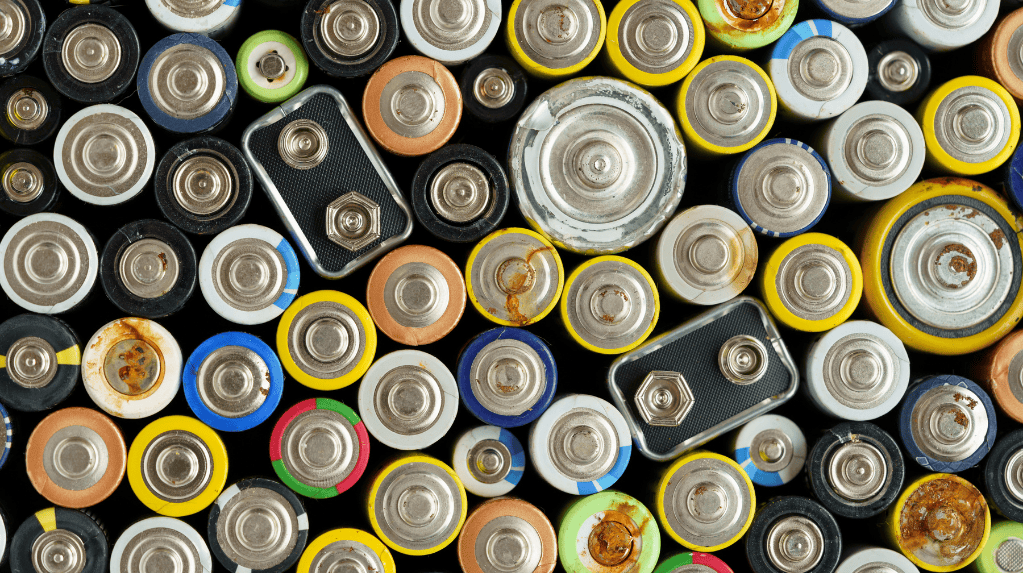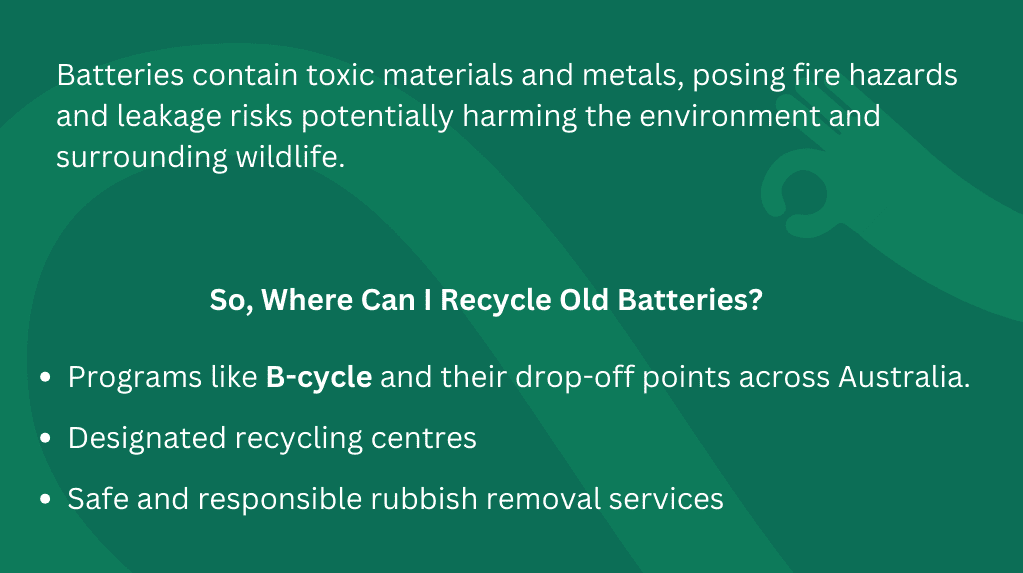
Each year, Australia disposes of old battery waste that either ends up in local landfills or shipped overseas. According to the CSIRO, this amount was 3,300 tonnes in 2020.
Research by the University of Technology Sydney estimates that the increasing uptake of electric vehicles (EV) is set to push this number even further, with an estimated 30,000 tonnes of EV batteries entering the waste stream in 2030.
Considering how so many of our modern appliances are powered by batteries, we should be aware of the importance of proper battery recycling and disposal to reduce the impact of battery waste on our environment.
This guide will reveal how you can dispose of old batteries safely, as well as where you can dispose of them in Australia.
Can you Recycle Old Batteries?
Recycling is the best way to dispose of old batteries, so generally, the answer is yes.
But it’s not that straightforward. Whether or not old batteries can be recycled will depend on the kind of batteries they are. Batteries can have vastly different compositions — lead acid batteries can be easily recycled with an efficiency of 90%, while lithium-ion batteries have a much more complex recycling process for a yield ranging from 25-96%.
In other words, the first step is to identify the type of batteries you’re disposing of. Knowing this will inform your decision as to whether it can or can’t be recycled.

Types of Batteries that can be Recycled
Lead-Acid Batteries
Found most commonly in cars, boats, and other heavy-duty vehicles, these heavy-lead batteries can and must be recycled due to the high lead content that is present in them. Lead batteries in Australia have a near 100% recycling rate and should be recycled whenever possible. The recycling process for lead batteries is also very cost-effective and helps prevent the need for the use of new materials to manufacture new batteries.
Nickel-Cadmium Batteries
Nickel-cadmium batteries are less common in commercial and household applications these days but still see use in certain industrial supplies. You may encounter them in smaller, low-powered appliances such as solar path lighting and Christmas tree lights where their consistent output is best utilised. Because of the toxic cadmium, nickel-cadmium batteries must be recycled properly and not simply thrown out.
Nickel-Metal Hydride Batteries
Nickel–metal hydride battery is a type of rechargeable battery that sees a lot of use in digital cameras and other high-drain devices due to its ability to outperform alkaline batteries. Having said that, they eventually lose their efficiency over time and need to be recycled to prevent their toxic components from damaging the environment.
Lithium Primary Batteries
Not to be confused with lithium-ion batteries, lithium batteries are single-use batteries that cannot be recharged. Lithium batteries can be recycled and should be whenever possible. They can commonly be found in a coin-shaped form and are used to power small electronics like smoke detectors, watches, and laptops.

Lithium-ion Batteries
Lithium-ion batteries are the most common rechargeable type of battery available today. It is sold commercially in AA, AAA, 9 or 12-volt forms, and can also be found in smartphones, wireless headphones, and most notably, electric vehicles. The current technology for recycling Li-ion batteries is still being optimised, and recycling rates in Australia for lithium-ion batteries lie at just 10%. The Australian Government is taking steps to help increase recycling for lithium-ion batteries by offering collection services through retailers.
Alkaline Batteries
Perhaps the most commonly seen and bought type of battery across the world, alkaline batteries are primary batteries that see use in everyday objects, from tools to toys. Recycling your AA and AAA alkaline batteries is a great way to ensure that their materials are reused in the creation of new batteries.
What Happens when Batteries are not Disposed of Properly?
Batteries should not be thrown away into the bin since they contain toxic materials and metals that can pose fire hazards and leakage risks.
Most commercially sold batteries will often come with warnings printed on their sides that advise against bin disposal. The reason for this is that the complex chemical compositions within batteries often contain toxic substances that can poison the environment and wildlife if they leak into the ground or water sources.
The likelihood of this happening increases when they are placed in bins or exposed to the sun, which can cause their protective outer layers to degrade and release the harmful substances within.

What Happens to Batteries when they are Recycled?
Batteries that undergo recycling are broken down and separated into their constituent elements through specialised processes. Each type of battery has its own recycling process that is designed to deal with the substances within. Recycled batteries are stripped, crushed, and melted to obtain the basic metals and elements that they are made of. Once they are collected, these materials are then used in the production of new batteries or other electronics.
Where Can I Dispose and Recycle Batteries in Australia?
When it comes to recycling your used or old batteries in Australia, you have several options.
B-cycle is Australia’s national product stewardship scheme for battery recycling. The program has over 100 organisational partners across the nation that provide battery recycling drop-off points. Most major chain supermarkets like Coles and Woolworths, as well as wholesale suppliers like Officeworks and Bunnings have these battery recycling drop-off points. You’ll be able to find a full list of the locations on B-cycle’s website.
However, not all batteries are accepted at these drop-off points. Larger batteries from vehicles and computer equipment need to be deposited at designated recycling centres. Most city councils will have the location of the nearest recycling centres, but transporting the old batteries can be dangerous if not handled properly.
For safe and responsible battery disposal, you can engage the services of a rubbish removal company to ensure that your battery waste is recycled properly. Ridly rubbish removal offers convenient battery disposal for residents in Sydney city areas such as Bondi Junction and Botany Bay. We can collect your old or used batteries anytime and help you recycle responsibly.